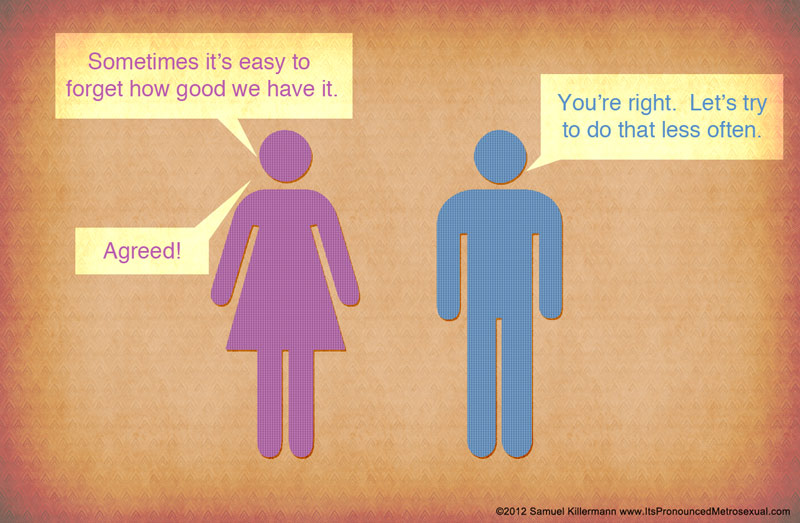Privilege and Intersectionality
- What is Privilege?
- Intersectionality
- White Privilege
- (Anti)Racism
- Male Privilege & Masculinities
- Class Privilege & Economic Inequality
- Christian & Religious Privilege
- (Dis)ability and Ableism
- Language Privilege and Code Switching
- Physical Appearance (Body Size, Hair, Colorism)
- Straight & Cis Privilege: Sexuality & Gender Identity
- Nationalism, Citizenship, Immigration
- Age & Ageism
- Suggest a Purchase for the Collection This link opens in a new window
- Ask a Librarian This link opens in a new window
Straight & Cis Privilege
Straight or Heterosexual privilege:
The act of privileging or preferring male–female relationships and sexuality over same-sex relationships.
Related concepts are heterosexism (bias toward male-female sexual activity); heterosexual assumption (the belief that everyone is heterosexual and that heterosexuality is the normative, moral, and correct sexuality), and heteronormativity (the assumption that heterosexuality is the hegemonic sexuality norm).

Cisgender privilege: the unearned benefits you receive when your gender identity matches your sex assigned at birth. For example, you are not questioned about what restroom you should be using, denied access to healthcare, misgendered when addressed or spoken about, asked what your "real" name is, or fearful of violence because of your gender presentation.
Definitions from around the web:
|
" cisgender /“siss-jendur”/ – adj. : a gender description for when someone’s sex assigned at birth and gender identity correspond in the expected way (e.g., someone who was assigned male at birth, and identifies as a man). A simple way to think about it is if a person is not transgender, they are cisgender. The word cisgender can also be shortened to “cis.” Cisgender privilege are the benefits that result from your alignment of identity and perceived identity. Read more at : 30+ Examples of Cisgender Privileges (It's Pronounced Metrosexual) " |
|
" Not unlike straight privilege or white privilege, “cisgender privilege” is a term used to refer to the advantages that cisgender people receive for being treated as society’s default gender identity. "The prefix “cis-” is Latin for “on this side of”; whereas trans is used as a prefix for “on the other side of.” Etymologically speaking, that means “cisgender” translates to “on this side of experiencing gender” and “transgender” means “on the other side of experiencing gender.” The prefixes are used to connotate gender transitioning, and how cisgender people experience the “side” of the gender they’re assigned at birth, while transgender people transition to another gender, or side, than the one given to them after birth.... “Cisgender” itself took off because the term gives proper contrast between cis and trans experiences, accurately portraying cisgender people without defining cisgender men and women as humanity’s default gender identities. By calling cisgender people “cisgender” instead of using a word like “common” or “normal,” activists and gender theorists could avoid stigmatizing trans people in their work. " From: "A Guide to Understanding Cisgender Privilege" by Ana Valens |
Heterosexual/Straight Privilege
Cis/Gender-conforming Privilege
-
30+ Examples of Cisgender Privileges (It's Pronounced Metrosexual)If you identify with the gender you were assigned at birth, here are a bunch of unearned benefits you get that many folks do not. Read them and consider them. It’s not about shame. It’s about understanding.
-
Deconstructing Privilege: Teaching and Learning as Allies in the Classroom by Kim Case (Editor)
Call Number: LC4941 .D43 2013ISBN: 0415641454Publication Date: 2013-06-10See the chapter: Are We Queer Yet? Addressing Heterosexual and Gender-Conforming Privilege / Markie L. C. Blumer -
The GENDER Book by Mel Reiff Hill (Illustrator, Created by); Jay Mays (Created by); Robin Mack (Other Primary Creator)
Call Number: HQ77.9.H55 2013ISBN: 9780991338009A fun, colorful, community-based resource that illustrates the beautiful diversity of gender - a gender 101 for everyone!
Also ONLINE @ thegenderbook.com -
Not Gay: Sex between Straight White Men by Jane Ward
Call Number: HQ28 .W37 2015ISBN: 1479825174Publication Date: 2015-07-31...these sexual practices reveal a unique social space where straight white men can--and do--have sex with other straight white men; in fact, she argues, to do so reaffirms rather than challenges their gender and racial identity. Ward illustrates that sex between straight white men allows them to leverage whiteness and masculinity to authenticate their heterosexuality in the context of sex with men. By understanding their same-sex sexual practice as meaningless, accidental, or even necessary, straight white men can perform homosexual contact in heterosexual ways. These sex acts are not slippages into a queer way of being or expressions of a desired but unarticulated gay identity. Instead, Ward argues, they reveal the fluidity and complexity that characterizes all human sexual desire. In the end, Ward's analysis offers a new way to think about heterosexuality--not as the opposite or absence of homosexuality, but as its own unique mode of engaging in homosexual sex, a mode characterized by pretense, dis-identification and racial and heterosexual privilege. Daring, insightful, and brimming with wit is a fascinating new take on the complexities of heterosexuality in the modern era. -
Thinking Straight: The Power, Promise and Paradox of Heterosexuality by Chrys Ingraham (Editor)
Call Number: EBOOKISBN: 9780415932738Publication Date: 2004-11-16This collection of original essays will unravel the current heterosexual scene in two parts: one on rights and privileges, the other on popular culture. Topics covered include weddings, proms, citizenship, marriage penalties, cartoons, mermaids and myth.
Scholarly articles
-
Tony J. Silva. 2019. “Straight Identity and Same-Sex Desire: Conservatism, Homophobia, and Straight Culture,” Social Forces, 97(3): 1067-1088. hThis paper uses the 2013–2015 NSFG, a representative US-based dataset of individuals 15–44, to explore predictors of straight identification among all women and men and among subsets with substantial same-sex activity and/or attraction. After controlling for attractions and sexual practices, homophobia predicted straight identification in all groups. Among both groups of women, one femininity attitude and motherhood also predicted straight identification. One attitude reflecting alignment with normative masculinity significantly predicted straight identification among men with substantial same-sex activity and/or attraction. This paper also uses two waves of Add Health, a representative survey of young adults, to examine change to sexual identity over six years. Results show that among individuals who changed sexual identities between waves, heightened religiosity and political conservatism across waves were associated with increased odds of changing to a straight identity for women, but not for men. This suggests but does not prove a directional association between attitudes and identification for some individuals. Latent class analyses also found distinct groups of straight-identified men and women with substantial same-sex activity and/or attraction, indicating that it is a heterogeneous population in terms of attitudes, including homophobia. This suggests that straight identification is due partly to embeddedness in straight culture and enjoyment of straight privilege, not simply homophobia. While impossible to determine causality, the results show that straight identification is strongly related to non-sexual social factors, including religiosity and attitudes about sexuality and gender, in addition to attractions and sexual practices. The results also suggest that homophobia is related to identity formation for women, as well as men, but that there is substantial within-group variation.
-
Nunn, Lisa M., Sandra Sgoutas-Emch, Steven Sumner, and Evelyn Kirkley. 2017. “Girls Get Free Drinks: Undergraduates’ Misunderstandings of Heterosexual Privilege.” Journal of Homosexuality 64 (12): 1684–99. doi:10.1080/00918369.2016Heterosexual privilege is a challenging concept to teach in undergraduate courses. Using data from self-reflection essays on the first and last days of the semester, we present students’ learning and growth in their understanding of heterosexual privilege and their ability to distinguish it from cisgender privilege. The majority of students accurately identified an instance of heterosexual privilege in their lives and discussed the counterpart to privilege: the marginalization and/or disenfranchisement experienced by individuals who hold other sexual identities. This article highlights the two most common misunderstandings of heterosexual privilege that emerged in students’ writing. On the first day of class, 18.2% outright denied that heterosexual privilege exists, and 17.6% conflated gender with sexuality. It reduced to 11.9% and 11.3%, respectively, on the last day of class. We saw growth in students’ sophistication of perspective even for some students who demonstrated these misunderstandings at the end of the term.
-
Kim Case, and Briana Stewart. 2010. “Heterosexual Privilege Awareness, Prejudice, and Support of Gay Marriage Among Diversity Course Students.” College Teaching 58 (1): 3. doi:10.1080/87567550903252843.Although most research investigating diversity courses focuses on attitudes toward racial minorities and women, these courses may also influence student attitudes toward lesbians and gay men. The current study assessed student awareness of heterosexual privilege, prejudice against lesbians and gay men, and support for same-sex marriage. Students (N = 143) in a general diversity course completed identical surveys during the first and last weeks of the semester. Participants in diversity courses exhibited increased heterosexual privilege awareness and support for same-sex marriage, as well as less prejudice against lesbians and gay men, during the last week of the semester compared to pretest levels.
-
Case, Kim A., Rachel Hensley, and Amber Anderson. 2014. “Reflecting on Heterosexual and Male Privilege: Interventions to Raise Awareness.” Journal of Social Issues 70 (4): 722–40. doi:10.1111/josi.12088Gender-focused college courses seek to increase understanding of the systematic advantages associated with dominant group membership. These courses attempt to reduce prejudice and raise awareness of male and heterosexual privilege. Inclusion of privilege content within gender-focused courses has increased, but research to test interventions to increase privilege awareness and reduce prejudice remains sparse. The current studies provide experimental information about awareness of heterosexual privilege (Study 1) and male privilege (Study 2) and specific interventions for use in education, professional development, and community settings. Study 1 found the video intervention was effective in increasing heterosexual privilege awareness and internal motivation to respond without prejudice. Study 2 found that male privilege awareness was significantly increased and modern sexism was reduced by the video intervention. Findings provide information for applied practices such as pedagogical strategies when designing diversity courses and training workshops
- Last Updated: Oct 10, 2025 4:24 PM
- URL: https://guides.rider.edu/privilege
- Print Page




